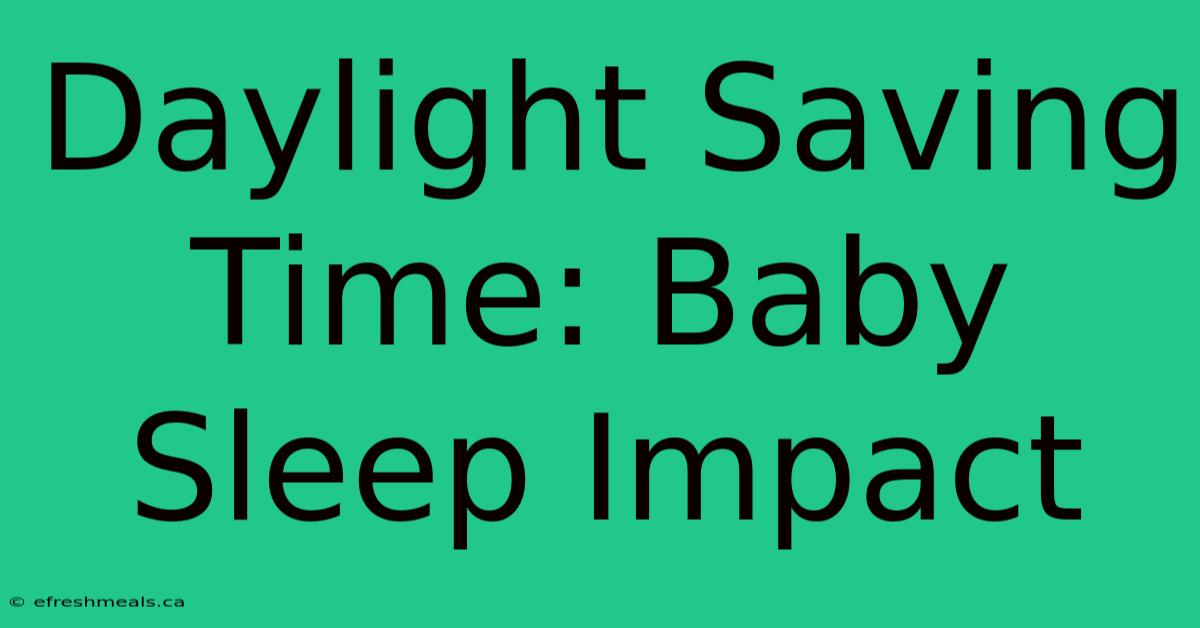Daylight Saving Time: Baby Sleep Impact

Discover more detailed and exciting information on our website. Click the link below to start your adventure: Visit Best Website nimila.me. Don't miss out!
Table of Contents
Daylight Saving Time: Is It Messing With Your Baby's Sleep?
Have you noticed your little one struggling with sleep after the clocks change for Daylight Saving Time? You're not alone! Many parents report a disruption in their baby's sleep patterns during this transition. But why does Daylight Saving Time have such a significant impact on baby sleep?
Why It Matters:
Daylight Saving Time, while designed to save energy, can wreak havoc on a baby's delicate sleep schedule. Babies thrive on routine, and any shift in their sleep-wake cycle can lead to fussiness, tiredness, and difficulty settling down for naps and bedtime. This article delves into the relationship between Daylight Saving Time and baby sleep, providing insights to help you navigate this challenging period.
Key Takeaways of Daylight Saving Time Impact:
| Takeaway | Description |
|---|---|
| Shift in Circadian Rhythm | Daylight Saving Time disrupts the natural sleep-wake cycle, making babies feel sleepy at different times. |
| Increased Exposure to Light | The extended daylight hours can confuse your baby's internal clock, leading to delays in melatonin production for sleep. |
| Change in Routine | The abrupt change in bedtime and wake-up time can cause stress and confusion, making it harder for babies to settle down. |
Daylight Saving Time: A Deeper Look
Impact on Circadian Rhythm
A baby's circadian rhythm, the internal clock regulating sleep-wake cycles, is still developing. This makes them highly susceptible to external influences like Daylight Saving Time. The sudden shift in light exposure disrupts their natural sleep patterns, leading to a mismatch between their internal clock and the external environment.
Increased Light Exposure
The extended daylight hours can suppress melatonin production, a sleep-regulating hormone. This can lead to difficulties falling asleep and staying asleep, making babies more prone to fussiness and sleep problems.
Changes in Routine
Daylight Saving Time can lead to a sudden shift in bedtime and wake-up times, disrupting a baby's established sleep schedule. This inconsistency can create anxiety and confusion, making it harder for babies to settle down for naps and bedtime.
Navigating the Impact of Daylight Saving Time
Adjusting Sleep Schedule
- Start Early: Begin adjusting your baby's sleep schedule a few days before the clock change, gradually shifting their bedtime and wake-up times by 15 minutes each day.
- Consistent Routine: Stick to a consistent bedtime routine, even during the transition period. This provides comfort and helps signal sleep time.
- Light Exposure: Ensure your baby gets adequate light exposure during the day and create a dark and quiet sleep environment at night.
Managing Sleep Disruptions
- Pacify and Soothe: Be patient and offer extra comforting measures like rocking, singing, or breastfeeding to help your baby calm down.
- Seek Professional Help: If your baby's sleep problems persist, consult your pediatrician or a sleep consultant for personalized advice.
FAQ for Daylight Saving Time and Baby Sleep
| Question | Answer |
|---|---|
| How long does it take for a baby to adjust? | It can take several days or even weeks for a baby's sleep cycle to fully adapt to the time change. Be patient and consistent with your routines. |
| Are there any tips for naps? | Stick to your baby's usual nap schedule and ensure their sleep environment is dark, quiet, and cool. Offer a nap routine similar to bedtime to promote sleepiness. |
| What if my baby is already a good sleeper? | Even babies who are normally good sleepers may experience some disruptions during the time change. Maintain consistency and provide extra soothing support. |
| Can I use blackout curtains? | Using blackout curtains can help create a dark sleep environment, which can be especially beneficial during the time change. |
| Should I avoid screen time? | Limit screen time for your baby, especially in the hours before bedtime. The blue light emitted from electronic devices can interfere with melatonin production. |
Tips for Managing Daylight Saving Time
- Start early: Begin adjusting your baby's sleep schedule a week before the clock change.
- Be consistent: Stick to a consistent bedtime routine, even during the transition period.
- Create a dark and quiet sleep environment: Blackout curtains and a white noise machine can help.
- Offer extra comfort: Provide extra soothing measures like rocking, singing, or breastfeeding.
- Seek professional help: If your baby's sleep problems persist, consult your pediatrician or a sleep consultant.
Summary by Daylight Saving Time Impact
Daylight Saving Time can significantly impact your baby's sleep patterns, causing disruptions in their sleep-wake cycle, increased light exposure, and changes in routine. By understanding the challenges and implementing strategies to manage them, you can help your baby adjust smoothly and regain their restful sleep.
Closing Message:
As you navigate the challenges of Daylight Saving Time, remember that patience and consistency are key. Providing a stable and predictable environment can help your baby adjust more easily and regain their healthy sleep habits.

Thank you for visiting our website wich cover about Daylight Saving Time: Baby Sleep Impact. We hope the information provided has been useful to you. Feel free to contact us if you have any questions or need further assistance. See you next time and dont miss to bookmark.
Featured Posts
-
Cheney Faces Trumps Outrage Roll Call
Nov 02, 2024
-
Islanders Win End Losing Streak Vs Sabres
Nov 02, 2024
-
J Lo Condemns Puerto Rico Joke Offends Latinos
Nov 02, 2024
-
Dia De Los Muertos Events And Locations
Nov 02, 2024
-
Daylight Saving Time Adjusting Babys Sleep
Nov 02, 2024
